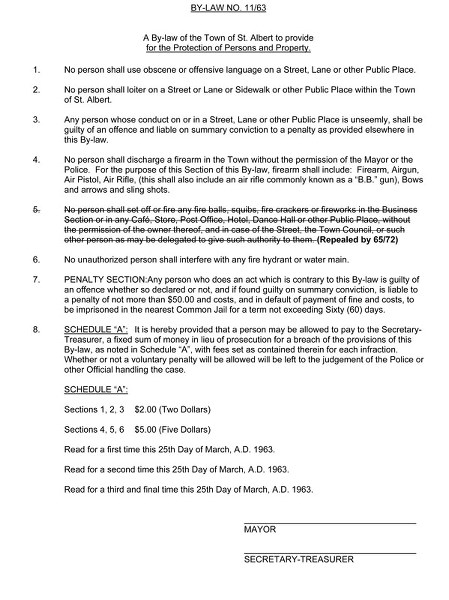If you use obscene language in a public place in St. Albert, you're running the risk of a $10 fine.
If you use obscene language in a public place in St. Albert, you're running the risk of a $10 fine.
While people across Alberta all took a few minutes to snigger at the Town of Taber's community standards bylaw this week, the fact that many municipalities in Alberta have similar legislation went unnoticed.
The Taber bylaw includes a curfew and fines for spitting, swearing, and a section that has drawn criticism for potentially infringing on Canadian charter rights, which prohibits people from being part of a group of three or more when a peace officer has reasonable grounds to believe they'll disturb the peace.
The passage of the bylaw has drawn massive attention, including a campaign for Kevin Bacon to come visit Taber, a reference to Bacon's role in the popular 1980s movie Footloose that featured a small town where dancing was outlawed.
Red Deer has similar community standards bylaws, including the spitting, swearing and groups of three people rules. Strathcona County has a curfew on the books. The list could go on.
St. Albert's own community standards bylaw largely addresses property issues.
But Bylaw No. 11/63, a bylaw to provide for the “protection of persons and property” in St. Albert is still on the books.
It was enacted in 1963, but manager of policing services Aaron Giesbrecht confirmed it is still an active bylaw.
“It's been on the books for awhile and something we've recognized needs to be reviewed,” Giesbrecht said.
In his 15 years in St. Albert, he hasn't seen the sections on obscene or offensive language, loitering or “unseemly” conduct in a public place enforced – but a section dealing with the discharge of firearms has been used on occasion.
While St. Albert doesn't have a curfew, “they're not uncommon to see,” he said, noting it's been raised in this city throughout the years.
Reviewing the bylaws does take time and resources, he said. This one is on the list but hasn't been made a priority.
The use of obscene or offensive language on a street, lane or other public place, loitering or conducting yourself in an “unseemly” manner originally were good for a fine of $2. In 1986, the fines were updated to $10, and that's where the price has stayed.
“That speaks to part of the reason why it's not really used. Those fine amounts aren't effective deterrents for that behaviour,” Giesbrecht said. Discharging the firearm without the permission of the mayor or police, and an unauthorized person interfering with a fire hydrant or water main, are offences worth a $25 fine.
He also pointed out there's a section in the Canadian Criminal Code where charges can be laid for causing a disturbance in a variety of ways, ways that include obscene language, screaming and even singing.
Cpl. Laurel Kading of the St. Albert RCMP said the causing a disturbance section is used as an enforcement tool frequently, though charges aren't often laid under it.
“There's a lot of times where we may use the section as a tool to make an arrest under it to stop the disturbance from happening,” Kading said.
In 2013, the St. Albert detachment had 330 calls where the incident would have been classified as causing a disturbance. Only 10 charges were laid, and all of them were related to being drunk.
In 2014, there were 366 times calls were filed under that section, but only four charges – three times for being drunk while causing unruly noise, and one time using a municipal noise bylaw for causing unreasonable noise.
The RCMP value Canadians' rights highly, Kading said. But the legislation at various levels makes sure they have the ability to act at all, instead of turning complaints away due to a lack of authority. It also provides options of how to address issues, like using a bylaw fine instead of a criminal charge.
“Using the municipal bylaws along with provincial laws and if necessary the criminal code laws really does allow the different enforcement sections to give an all around service to the community,” Kading said.
“Some people might think it's very foolish to have something that makes swearing a municipal bylaw, but if we go into – let's say a hockey rink and someone's completely out of control but they're not drunk, all they're doing is swearing, but it's so offensive to people around them, well, we need something that allows us to take action,” she said.
